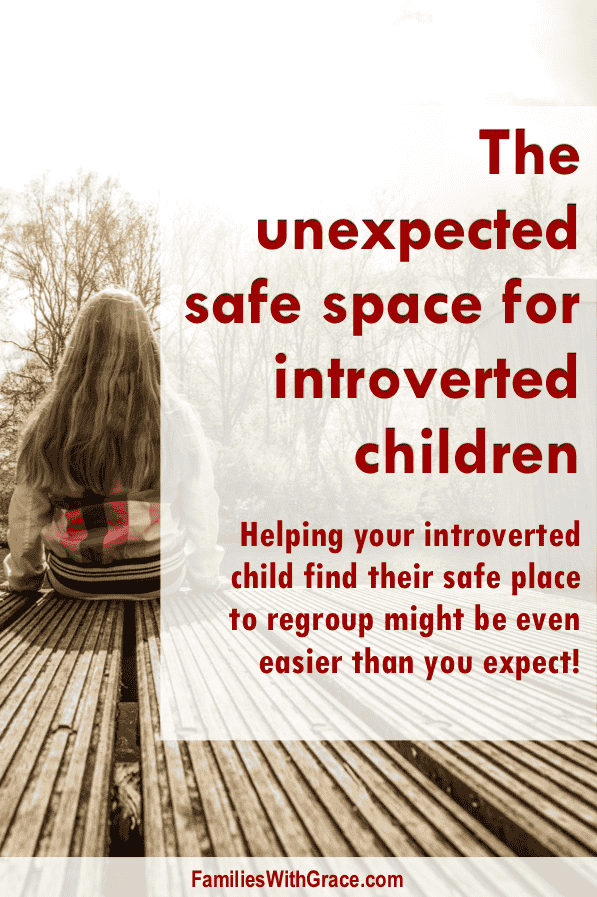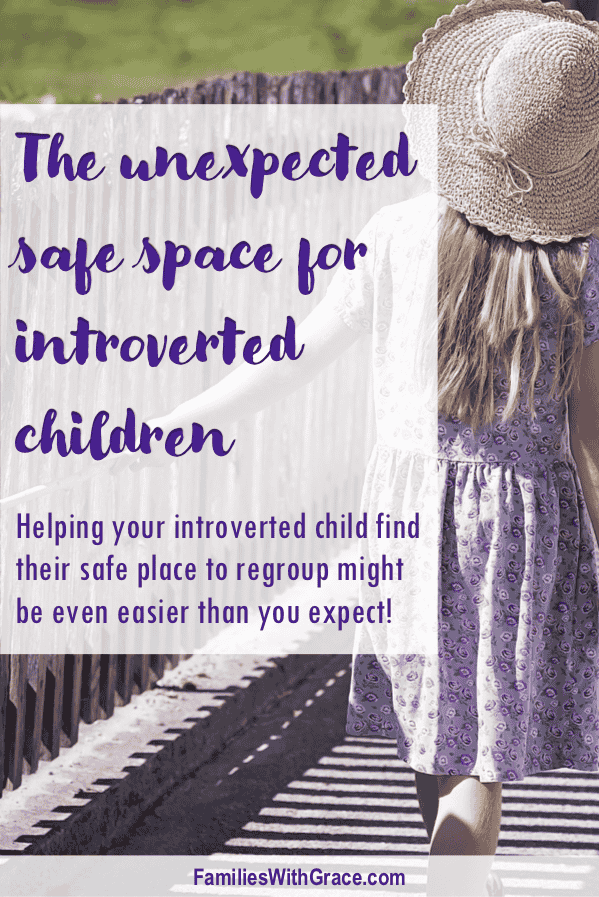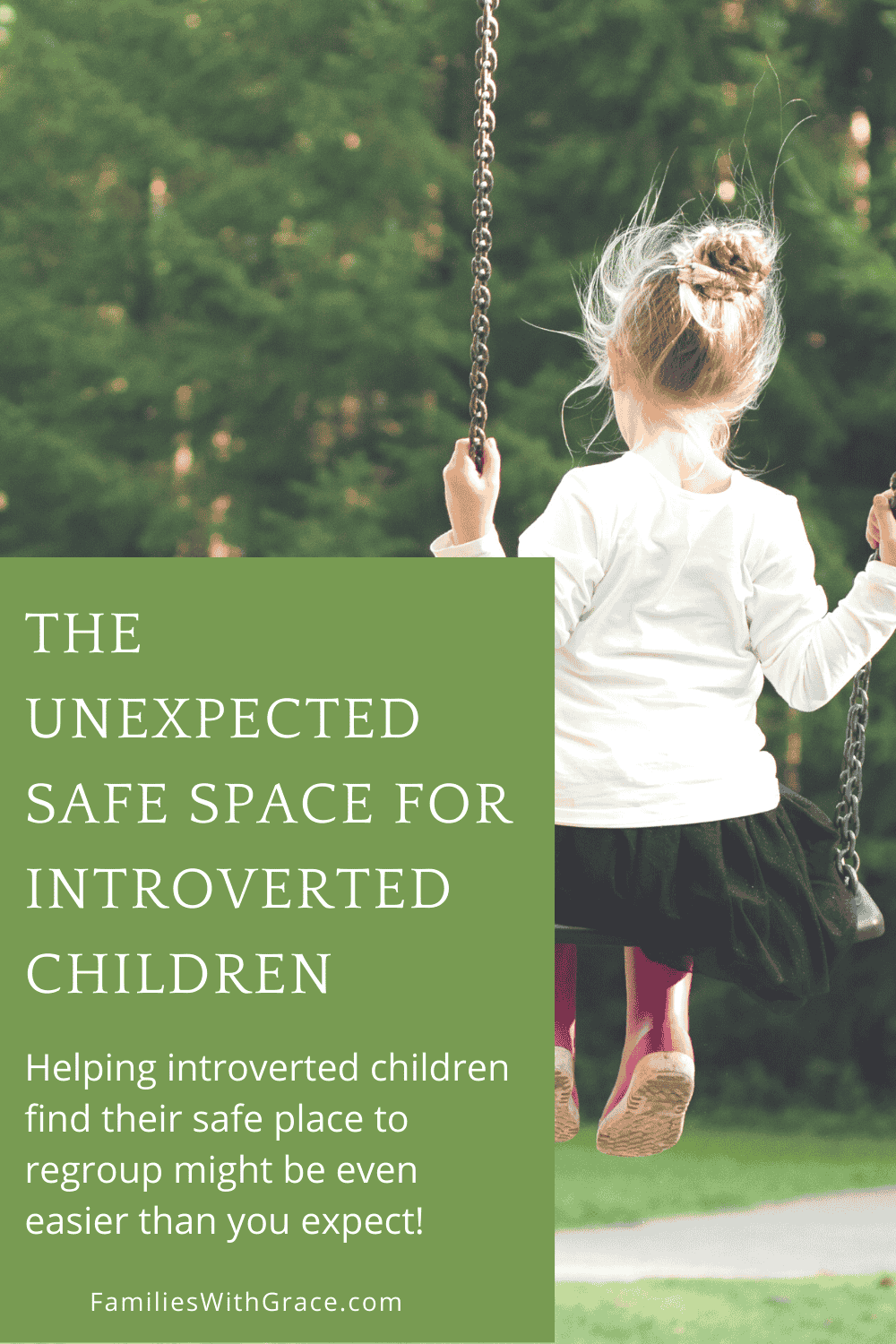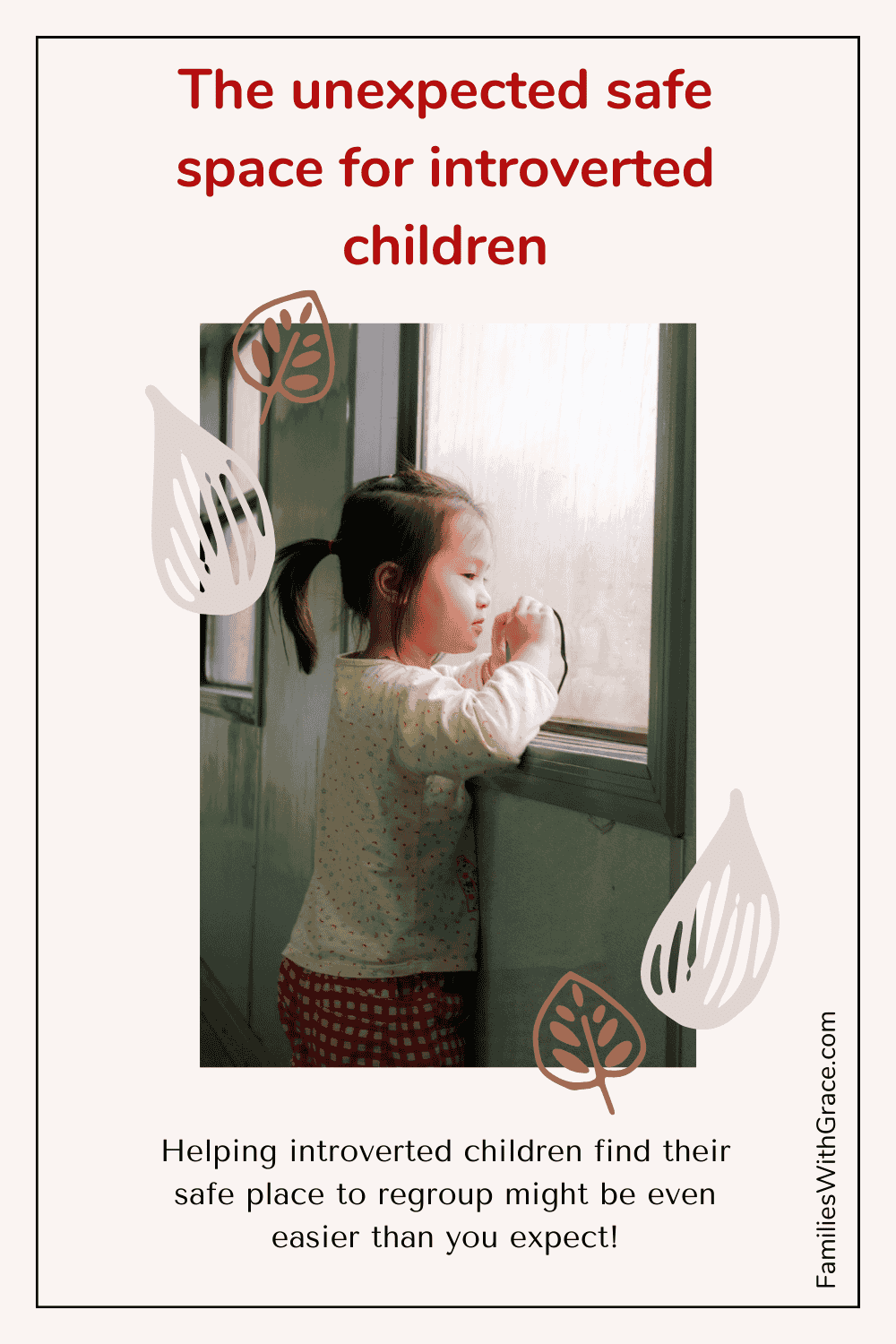Helping introverted children find their safe place to regroup might be even easier than you expect!
Growing up as an introverted child, I felt like I was a bit just odd. I wasn’t around all that many other introverted children. As an adult I learned the difference between being an introvert (we refuel our energy solo) and an extrovert (they refuel their energy with others). Suddenly, I made a bit more sense and, quite frankly, didn’t feel so weird.
These days, I can more easily identify my needs better for when I need downtime. I recognize when I feel antsy and irritated because I need some quiet and space to myself.
I had a pretty good handle on my introverted self. And then we decided to start our family. I wondered how I’d manage the needs of an extroverted child without completely draining myself. I wondered if I’d be able to teach an introverted child how to embrace their introversion and find their place in the world.
My extroverted child — the toddler years
When my daughter was born 11 years ago, she was our first child. We were so excited for her arrival. I remember looking into her eyes and wondering what she was going to be like.
It wasn’t long before her personality started emerging. Before she turned 1, she was vocal. She started speaking early and plainly, but even before she used actual words, she babbled pretty much all the time. I used to joke that she’d talk herself awake and asleep — and that was true!
When we’d go to the grocery store, she’d wave at everyone who waved at her. As we’d go get the mail, she’d happily get the attention of our neighbor and chat. It didn’t take me long to realize that she loved interacting with other people.
We hit up library story time once a week for a couple of years so she could hang out with some other kiddos. She didn’t always want to play with the kids, but she liked being around them.

The other thing we noticed about our daughter early on is that she is pretty even-keeled. Of course she got upset about things and wasn’t happy all the time, but she was so verbal that we could talk about things with her to keep her frustration to a minimum. She was neither overly happy nor overly unhappy.
My introverted child — the toddler years
Then my son was born three years later. He started off a bit more challenging right away. In fact, he was born not breathing and was “Code Pink” (the infant version of “Code Blue”). He spent about 20 minutes needing help to breathe before he breathed on his own.
But as he grew, we noticed right away that he had big feelings. He was happy or he was sad. The kiddo didn’t have much middle ground. He definitely was more physically attached to us. Our son loves snuggles.
He was also an early talker. While he was a friendly toddler as well, he was also a bit more laidback about it than his sister. He seemed fearless to us in some ways because he wasn’t nearly as cautious as his sister when it came to trying things.
We learned that whatever he did, he’d do full force and woe to anyone or anything who tried to stop him. He liked things like library story time enough but he wasn’t as excited about them as our daughter was.
My extroverted child — the school years
After a couple of years of part-time nursery school, my daughter started kindergarten with nary a fear. She was so excited and happily waved good-bye to us on the first day.
She soon made new friends. And we were careful to talk with her about her leadership skills so that she wouldn’t be too “bossy!” Her ideal birthday party was inviting everyone she could. I had to limit her to what was manageable or she would have invited all 44 kids in her grade.
She has remained this way. These days she prefers birthday parties with a few close friends to spend the night. But I’m pretty sure she’d invite even more if I agreed.
I have never had to wonder if she’d speak up for herself or talk during class. She can happily chat with adults and kids anywhere she goes. She has no qualms about talking to people and I’ve seen her work to include quieter classmates as well.
When I went on a field trip with her last year, she opted to sit with her friends on the bus instead of with me (with my blessing). She’s happiest right now when she’s on her tablet video-chatting with friends. During this time of isolation, we have continued to check in with her and help her connect safely when she can. We are so thankful for video chatting!
My little extrovert happily messages and chats with her teachers. She thrives and re-energizes with others.
My introverted child — the school years
When my son started kindergarten (again after two years of part-time nursery school), it was a bit different. While he didn’t have a complete meltdown as his dad and I left the classroom on day one, I saw tears spring to his eyes briefly as he waved good-bye.
For the first week of school, he came home drained and sad for having been away from me all day. He continues to have big feelings. He is happy or sad.
When I have gone on field trips with him, he most enjoys being with me as much as possible. Even when I suggest he sit with a friend, he still picks me.
At home, he is chatty and plays. He has an exceptionally good imagination and can easily give me long explanations of plans he comes up with to solve pretty much any problem someone could have.
He likes tagging along with his sister when we are out. Before the pandemic, he was happiest when he got to be with her like during children’s church. He would often pick hanging out with her over hanging out with other children.
For his most recent birthday turning 7 (pre-pandemic), he asked only for his three best friends to have a party with. He found the idea of inviting the entire class or too many extra people appalling.
Yet on the playground after school, he plays with a variety of classmates and comes up with some great imaginary play ideas as well.
I had a couple of people tell me my son was quiet and was surprised at first. I didn’t see that side of him like his Sunday School teacher and ninja zone teacher did.
It wasn’t until we started virtual schooling that I realized how quiet he is. The chatty kid I know is not so chatty in group settings. Unlike my daughter, he doesn’t strike up conversations with anyone and everyone. But when he is in smaller group meetings for school, he is more inclined to speak up.
When we are in the car, especially just the two of us, he will ride quietly for a couple of minutes and then we will have deep discussions about things he’s thinking about. He has some serious ponderings for a little dude!
I have realized that my son is an introvert like I am. I can’t say for sure he will always be this way, but from what I’m seeing right now, he is skewing much more introvert than extrovert. He loves when we can just stay home and not go places. (Good thing since we are staying socially isolated!)
The pandemic isolation hasn’t bothered him as much as it has my daughter. He’s enjoyed some video chats with his friends, but he is more reserved about chatting and doesn’t do it very often. (And I also know that his age and gender probably play a role as well.)
Finding my introverted child’s safe place
Having my kiddos home again all the time during the pandemic has given me even more insights into them and their temperaments. And I’ve been thinking about it.
As an introvert, I understand the need for a safe space. While I often think of my home as my safe and happy place, the truth is anywhere I am either alone or with those closest to me (my husband, children and parents) is my safe place.
I shared once about how being inside a tent in the middle of a busy theme park automatically put me at ease. I could breathe easier knowing that I was away from strangers.

I’ve wondered about my son’s safe place. Of course I think he feels safe at home overall, but I think his safe “place” is actually me. He is happiest and most content when we are together.
In fact, at first I thought he was an extrovert because at home he much prefers being with his dad, sister or me than being alone. That didn’t seem very introverted to me as an adult when I find myself craving alone time. And then I thought about it some more.
I realized I felt the same way growing up. My mom was my safe place. When we were out somewhere with lots of people or even just a few people I didn’t know, I’d gravitate toward her. I remember her lying in bed with me some nights when I was really young because that’s what made me feel safest and happiest.
I’ve seen other introverted kids act the same way. During uncomfortable situations for them (which can just be a noisy, busy atmosphere), they gravitate to a parent or trusted adult.
You are the safe space for your introverted child
So that leaves me thinking that one of our roles as parents of an introverted child is to be their safe space. Behavior that may come off as clingy may really just be your overwhelmed introverted child seeking consolation.
One of the things I established with my son a couple of years ago (before I really knew whether he was even an introvert) is that he can always ask me for alone time when we are out places. He struggles with big emotions; sometimes he needs to regroup. In talking with him about it, I realized that he regroups best with me.
Whenever he starts to feel overwhelmed, upset or like nobody is listening to him during times we are with other people — whether in a large group or small — he knows he can ask for one-on-one time and I will make it happen. We may make a trip to the restroom or go into another room if we are at someone’s house. But, he can trust that when he’s overwhelmed, I’ll be his safe space wherever we are.
So far every single time, after a couple minutes of talking privately together he has happily resumed the activity. It’s a strategy that works for him right now — and that definitely works for me!
I’ll keep learning as I go through phases of parenting how to best meet the needs of my extrovert and my introvert. Of course as two different people, my kids aren’t identical in what they need. With two opposite temperaments, those needs may be very different sometimes. My job is to keep paying attention and tweaking strategies to help them most.





